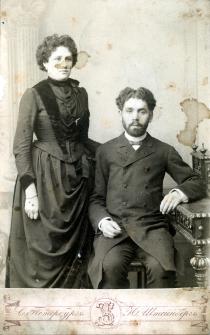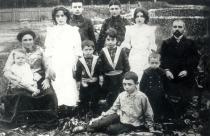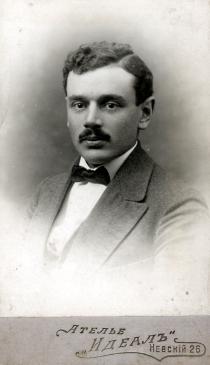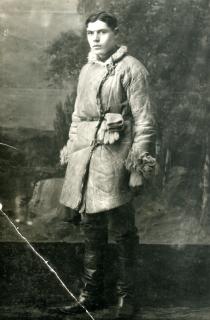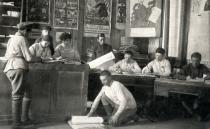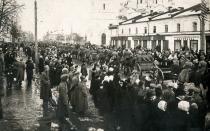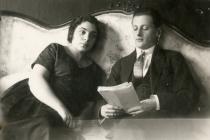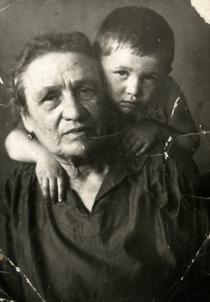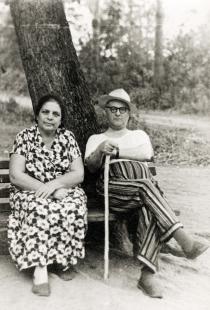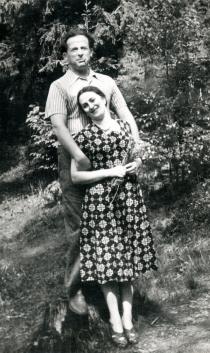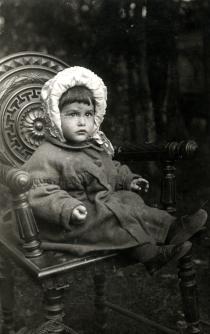
Mia Ulman
Saint-Petersburg
Russia
Interviewer: Aleksandra Ulman
Date of interview: November 2002
An interesting and intelligent woman sat in front of me. It was almost impossible to believe what she said about her life and what she survived: the siege, the war, the loss of the people closest to her. In spite of everything, Mia Yakovlevna has retained interest in life, a warm attitude towards people and a clear mind. I should mention that people around her are invariably well-disposed towards her. Even those, whom she meets incidentally, become pretty close friends of hers. Her house, which preserves her grandparents’ traditions, is open to everyone. Obviously, that is why Mia Yakovlevna looks so young and expresses so much love for life.
My name is Mia but everybody calls me Maria. I was born in January 1925 in Leningrad. I cannot tell you anything about my paternal grandparents, because I didn’t know them at all. They died when my father was young, and he never told me about them. I know that my father’s older sister and her family, who lived in Belarus, were killed by the Germans during the Great Patriotic War 1. My cousin on my father’s side was also killed by the Germans in Vitebsk during the Great Patriotic War. My father Yakov Plotkin was born in Rogachev, Belarus, in 1889.
My maternal grandfather, Semyon Ulman, was born in the village of Serebryanka near Luga [130 km south of Leningrad] in 1865. They had a big family. Before the Great Patriotic War they all lived in Leningrad. I remember his sisters, Vera and Mania, and his brother Arkadiy. They had a very close relationship. My grandfather often visited them. They also had big families.
My grandfather worked as a forester near Luga before the October Revolution [the Russian Revolution of 1917] 2. I don’t know where he worked in Leningrad, but I know that his job had to do with the timber industry. He was very well-educated and well-read. There was an excellent library in the house containing Jewish and secular literature. It was plundered during the Great Patriotic War when we were in evacuation in Moscow. They didn’t take the Jewish books though. We still have the two volumes of the History of the Jewish Nation published in 1914, and the 16 volumes of the Jewish Encyclopedia in Russian. My grandfather was old when I was born and I remember him having gray hair and a small beard. When I got up in the morning he was already dressed. He always wore a black suit and a tie and looked very neat. When he went out he put on a black coat and a hat. He survived the war and returned from Nizhniy Tagil, where he had been in evacuation. He died in 1948.
My maternal grandmother, Berta Bravo, was born in the town of Vilno. She was a housewife and raised nine children: Lev, Rakhil, Mikhail, Akim, Tira, Grigory, Nina, Vladimir and Esphir, my mother. Everyone called her Alexandra though, and she was also buried under this name. All the other children my grandmother gave birth to died as infants.
I also remember my grandmother’s brother and sister, Lev and Anna. Lev had two sons, Boris and Lazar, and a daughter, Raya. Lazar was an engineer and smelter and took part in the molding of Liteiny Bridge in Leningrad. [Editor’s note: The first steel bridge across the Neva was constructed to the design in 1874-79.] His family shared a house with us. Anna must have married her cousin too, because all members of her family were referred to as Bravo. We are still friends with one of her three children, Semyon, who was a professional military man, and his children. They left for Israel in 1990.
Two of my mother’s cousins on her mother’s side suffered during the arrests in 1937 [during the so-called Great Terror] 3. One of them, Lev’s son Boris, worked in Moscow as an editor for one of the central newspapers; I think it was Izvestiya. He was arrested and sentenced to execution by shooting. He was rehabilitated in the 1980s. I found out about it from the newspapers.
My mother’s brother Mikhail and his wife Raisa took in Boris’s son from his first marriage, Vladimir, and raised him together with their children, Yuriy and Yevgeniy. It was hard for Vladimir to live in Moscow, being the son of ‘an enemy of the people’, so they took him to Leningrad. I remember that he could draw very well. He left for holidays in 1941 to visit his mother Susanna in Moscow. He ran away from Moscow to the frontline as a volunteer and was a motorcyclist there. He perished almost immediately after that, during the first days of war. He was 16 years old. Our family didn’t lose contact with his Russian mother Susanna after the war. She visited us often, when we were in evacuation in Moscow.
My mother’s second cousin, Mikhail Bravo-Zhivotovsky, a professional military man, was arrested in 1937 [during the Great Terror] and rehabilitated during the war. He was conferred the rank of a major-general in artillery. He was in the war at the Leningrad frontline from 1941-1945 and survived. He retired after the war and died from an infarction in 1959.
My grandmother was illiterate, so my grandfather educated her, taught her how to read and write. She read a lot afterwards, including newspapers and magazines, which my grandfather bought and later subscribed to. My grandmother wore common clothes: blouses, dresses and skirts of pale colors. She sewed very well, and made clothes for all the children. She also inspired my love for needlework, and I later signed up for dress-making courses. She had a wonderful talent for raising children, everybody obeyed her implicitly. Later all grandchildren were raised by her – she had a good influence on them. In 1947 she got paralyzed and was bound to bed for the next three years. During that time she was lavished with care and attention by her children. She died in 1950.
By the time I was born the family of my maternal grandparents lived in Leningrad. They moved there after the Revolution of 1917 from the village of Serebryanka, where my grandfather was born.
The family owned a house in Serebryanka. The children studied at a Russian gymnasium. Apparently there was no Jewish school although a lot of Jews lived there. I know that there were two synagogues in Luga, but I don’t know to what extent the family was religious. They told me that one of our relatives, an Orthodox Jew, made friends with a Russian Orthodox priest in Luga. The son of that relative, Grigory Tsepliovich, recalled, how people had rejoiced over the Revolution of 1917 in Luga: ‘Someone explained to me that it was freedom for all people, and for us Jews it was joy and liberation from pogroms. I remember how father took me by the hand, led me outside and marched boldly with the crowd of many thousands. In the evening I saw the crowd in Uspenskaya street catch a police constable and break his head on the stone steps of the central drugstore. At night our family was woken up by the doorbell and drunk soldiers walked into the apartment. They told us to stand by the wall, took out their revolvers and announced: The tsar has been murdered. Rodzianko 4 ordered to kill all Jewish men!. But somehow our valuables appeared to be more precious to them than our death. Father soothed us and told us that they were bad people; that they were not satisfied with freedom; that there were more good people and everything would be fine. And everything did blow over, everybody danced and laughed.’
I assume that my grandparents knew Yiddish and Hebrew, but everybody spoke Russian at home. All their children got a higher education. The older children were the first to move to the city to study at various academies. Later my grandparents moved with the other children. Everybody lived in Leningrad in a big apartment.
Our big family was on very friendly terms, and all my aunts and uncles and their families spent holidays and weekends at our place. The big apartment allowed it. Jewish holidays were observed. My grandmother cooked traditional meals. I remember teyglakh, gefilte fish and triangles with poppy-seeds [hamantashen]. She baked matzah, a big, round one, on a huge stove at home. My grandfather didn’t like matzah very much, so my mother secretly gave him rolls. They were scolded by grandmother for doing that. For the birthdays of her grandchildren, she baked Napoleon cake with custard and teyglakh and sent grandfather to deliver the present.
The family also celebrated secular holidays. My mother even baked Easter cakes to celebrate Russian Easter. Our home was very hospitable. My parents’ friends and my aunts and uncles’ friends visited us often and with pleasure. They were received very warmly. It happened so that many of our friends were Russians. I remember Nikolay and Ekaterina Nikitin, who were very close friends of my parents. My mother’s brother Akim also had good Russian friends: Alexey Krotov and Yelena Rashevskaya. Alexey was Chief Medical Officer at the Institution of Mud-cures and Hydropathy, and Yelena worked as a neuropathologist there. I also remember my mother’s friends Alexandra and Olga. They were sisters and lived next door. Alexandra studied with my mother at the Institute. When my mother died in 1970, they helped us very much – they stood in line for the purchase of a grave stone, because it was very difficult to get one. There was a shortage of almost everything in the country. I also remember my mother’s pupil, Alexandra Filonova, a teacher, who was a close friend, too.
My grandparents took in their friends from Luga as lodgers. They were their distant relatives, and didn’t have a place to stay. Thus our apartment step by step became a communal apartment 5 by 1933.
Before World War II my grandmother had housemaids, who lived with the family and helped with the housework, although my grandmother went shopping, bought food and cooked herself. The first maid’s name was Pasha. She found a fiancé later and our family arranged a wedding for her because she had no relatives. We also helped the second maid, Nyusha. My father found her son a job at the Krasniy Metallist Plant, where he worked as Deputy General Manager.
Our house was very friendly, and children from different apartments played in the yard together. The apartments weren’t locked during daytime. In addition to the front door there were back entrances to the kitchens, with a simple hook instead of a lock. Dishes and food for winter were kept under a big window-sill in the hallway and nobody stole anything. The janitor, Sergey Ivanovich, locked the front door for the night. His daughter Lubov was my friend.
In 1938 my grandparents ordered a family picture for their golden wedding anniversary, a genealogical tree with an inscription in Hebrew. The inscription wasn’t translated. All their children keep this picture in their families to this very day. My grandmother was awarded a ‘Maternal Glory’ decoration after World War I. Mothers with many children were awarded such decorations. The award was presented to her in Smolny, in a building where the municipal power residence was located. In 1917 the headquarters of the Great October Socialist Revolution was situated in the building, and Lenin directed the armed rebellion from there.
No one of our family attended the synagogue when we lived in Leningrad, at least, I don’t remember doing so. All religious manifestations were suppressed on a state level during the Soviet times. We were never proud of our nationality, nor did we try to conceal it, even during the dreadful years of arrests [during the Great Terror] and the war. All my grandparents’ sons were members of the Communist Party by conviction, and my mother joined the Party at the beginning of the war, when the Germans approached Leningrad.
All my uncles and aunts founded families with Jewish partners, except for the youngest son, Vladimir, who married a Russian. My grandparents didn’t really mind his marriage to a Russian and loved his wife Tania as much as they loved their other daughters-in-law. Aunt Tania also loved them. She is still alive.
My mother’s older brother, Lev, lived with his wife Rosa Blonstein and their two children, Genrietta and Ilya. He worked as a legal adviser and his wife was a dentist. Genrietta was born in Leningrad in 1922. She got a higher technical education and worked as a leading specialist at the Electrosila Association to her very last day. She had no children. She died untimely of a serious illness at the age of 55. Her brother Ilya, who was born in 1924, pursued his career from a mechanical electrician to the deputy head of the Promsvyazmontazh Trust. He didn’t have children either. He also came to an untimely end at the age of 57.
My mother’s other brother, Mikhail, married his cousin Raisa Bravo and moved to Proletkulta street. The name of the street is interesting. It’s an abbreviation for Proletarskiy Kultura [Proletarian Culture], besides, it’s located right in the center of the city and crosses Nevsky Prospect, the main street of Leningrad. They had sons, Yevgeniy and Yuriy. I remember that before the Great Patriotic War uncle Mikhail was head of the Disinfection Stations of the Northern Ports. He perished at the front at the beginning of the war. Their older son, Yevgeniy, born in 1919, volunteered to the front, and was seriously wounded. His post-war life was connected with pedagogical activity in Leningrad and later in Magadan region, in the north of the country, where he headed the Mining Technical School. After retiring he returned to Leningrad with his family. He died in 1986. His only daughter, Natalia, lives in Krasnodar territory in the south of Russia with her husband.
Their younger son, Yuriy, was born in 1921 in Leningrad. Raisa paid special attention to her children studying German, so Yuriy attended the well-known Peterschule where all subjects were taught in German. It’s a special school with a good reputation. Education was free of charge in the USSR, thus nothing had to be paid. Raisa tried to provide good education to her children, which was typical of Jewish families. So Yuriy began to study at the Legal Institute right before the war and volunteered to the frontline when he was a second-year student. He participated in the Battle for Stalingrad. He was severely shell-shocked in the battles on Kurskaya Duga.
After returning from the front Yuriy worked as a teacher of military subjects at school and finally became the Deputy Chairman of the Leningrad Municipal Committee for Physical Culture and Sports. He was a well-known person in the world of sports, not only in Leningrad, but also in the former USSR. Yuriy died in 1999. His only son, Mikhail, emigrated to Canada with his family in 1994.
My mother’s older sister, Rakhil, married Mikhail Posherstnik. They had two children, a son called Lev and a daughter called Irina. Aunt Rakhil worked in a drugstore. Uncle Mikhail died in 1942 during the siege [the blockade of Leningrad] 6. Lev, born in 1920 and Irina, born in 1924, didn’t have families of their own. Lev was an office worker at the Krasniy Treigolnik Plant until he retired, and Irina was a pharmacist. Lev passed away in 1991, and Irina died in 2000.
My mother’s sister Tira married late. Her husband, Ilya Gutner, her cousin, was a professor at the Pediatric Institute. They didn’t have children of their own, but he had two daughters from his first marriage: Natalia and Irina, with whom I still keep contact. Aunt Tira was a dentist.
My mother’s brother Akim married Yevgenia Yekhilevskaya before the war. He worked as the head of the Planning Department at the Shipping Company and she was an epidemiologist. They didn’t have any children. Yevgenia participated in the Soviet-Finnish War 7. Akim died in 1979.
My mother’s sister Nina married Mikhail Model, a military man, before the war. She worked at the Leningrad State University Library. They didn’t have any children either. Nina died in 1971.
My mother’s younger brother, Grigory, learnt to play the piano at the Conservatory. He met his future wife Lyubov, who was a cellist, there. Besides, he graduated from the History Faculty of the Leningrad State University and defended his doctoral thesis. They had two daughters, Kima and Margarita. Kima was born in 1930 and Margarita was born in 1936. The name Kima means ‘Communist International of Youth’, it is an abbreviation in Russian. It was in fashion at the time to give Soviet names to children.
Uncle Grigory wrote to us from the front saying that he had left the last copy of his thesis in his bureau and asked us to pick it up. But their house had been destroyed by a bomb. The external wall of the building was ruined and everything was covered with debris. I remember me and my father trying to open Uncle Grigory’s bureau. We kept the thesis until he returned from the frontline. Both his daughters got a higher electrical-technical education and worked as leading experts at the Leningrad Leninets Association until their retirement. In 1996 Kima emigrated with her husband to live with her daughter in Canada. She already had two grandchildren by that time. Margarita emigrated with her husband and their younger daughter’s family to Israel in 1996, where her elder daughter lived with her family.
My mother’s youngest brother, Vladimir, married a Russian, Tania Verkhovskaya. They had two daughters: Lutsia and Larisa, who were both born in Leningrad. Uncle Vladimir was a lawyer, and before the Great Patriotic War, he worked at the Municipal Prosecutor’s Office. He perished at the front during the war. After Uncle Vladimir perished Aunt Tania was left alone with two children. Lutsia went to school and Larisa stayed at home. We took Larisa to Moscow from Nizhniy Tagil in order to help somehow.
Vladimir’s daughters graduated from the Leningrad Mining Institute. After graduating, Lutsia left with her husband, a fellow student, for Vorkuta. After retirement they returned to Leningrad, and they still live here. They have a daughter, who works as a teacher of literature, and their grandson is in the 10th grade now. Larisa worked as an engineer at a Scientific-Research Institute until her retirement. In 1994 she emigrated with her husband and her younger daughter’s family to Israel to live with her older daughter and granddaughters, who had left in 1990.
My mother studied at the Hertzen Primary Education Faculty of the Pedagogical Institute. She defended her final thesis when she was pregnant with me. She married Yakov Plotkin and continued to live with her parents. I don’t know how and when they met. I only know that their marriage wasn’t registered. They rented a room for some time not far from grandparents’ place, but by the time I was born they returned to my grandparents’. My parents only registered their marriage in the 1950s.
I was born in 1925. I was never taken to my grandfather’s birthplace, Serebryanka. But the summerhouses we rented nearly every summer, when I was a child, were located in that area, near Luga. I don’t remember anything interesting about those vacations, we lived there with families of my uncles and aunts and I played with my cousins. My aunts and uncles’ families rented neighboring summerhouses. I was sent to Vyritsa and Siverskaya, the suburbs of Leningrad, several times to spend the summer with the kindergarten. The standard Soviet kindergarten left for the country with children, if their parents weren’t able to arrange summer holidays for them.
I don’t recall anything interesting about my pre-school years. I went to a very good school which was called First Exemplary. It was a secondary general school. Children of various nationalities studied in that school, as well as in any other Soviet school. The school was really excellent: We had a school orchestra, arranged school performances and masquerades. Children of famous people studied with me such as the son of A. A. Bryantsev, the founder of the first children’s theater in Russia, and the son of S. Y. Marshak, who was a famous children’s book writer and translator of Shakespeare’s works. My grandfather picked me up from school every day. We went to the RosCond confectionary and had pastry and soufflé. We were scolded about it at home later, because I didn’t want to eat my lunch.
We hired a German lady to teach me German when I studied in secondary school. Anytime something didn’t come easy to me she hit me with the ruler on my head and hands. Once I hid behind a big stove in the corner of the dining-room before her arrival and she left, because she didn’t find me. My grandmother felt sorry for me and asked my parents to fire her. My next teacher succeeded to teach me two languages: German and French.
If I remember correctly up to 1937 no one in the family felt any anti-Semitism at all. I went to school, my aunts and uncles got excellent education and held high positions at work. 1937 was the year of arrests. [1937 was the worst year of the Great Terror.] Fortunately, they didn’t affect our family, though everybody expected trouble and terror. We flinched from every doorbell ring, when we sat together in one of the rooms in the evenings. People were arrested everywhere.
When the Great Patriotic War broke out in 1941, father signed up for the People’s Volunteer Corps, but he was brought back to the plant, because he had been wounded on his ear during the Civil War 8. He had an operation and his hearing became bad afterwards. All my uncles, except for uncle Lev, who was old and was brought back from the front because of his age, left for the front. Aunt Yevgenia and Aunt Rosa were mobilized. Uncle Vladimir and Uncle Mikhail perished at the beginning of the war. My cousins, Yevgeniy and Yuriy, were severely wounded.
Our family lived in Leningrad until the end of 1942. My father was working at the plant. My mother was manager at the Primary Education Department of the District National Education Department [RONO], and later she worked as a consultant for the Executive Committee Chairman. I was 16 years old. I took an active part in the self-defense group of the House Economy in preparing houses for defense. I put out fire-bombs, was on duty on the roofs and at the bomb-shelters and provided first aid for victims. The Executive Committee received letters with requests to find people, and I went to look for them. When the Germans threw fire-bombs during the siege [the blockade of Leningrad], the buildings trembled like houses of cards.
Once, during the bombing in the siege, I went to the opposite building. I went to the bomb-shelter to count the people there. At that moment a bomb hit the third floor, but it didn’t explode. The combat engineers neutralized it, but the exits of the bomb-shelters were filled up with debris. The light went out and it became stuffy. The red-haired plumber, who lived on the third floor of that building, began to shout, screaming that we would all die. He was arrested afterwards; he appeared to be on the German side. Fortunately we were saved, and the blockage was cleared.
Another time I went to the bomb-shelter located in 5 Sapyorny Lane. Two fire-bombs landed at the entrance, right in front of the windows, but didn’t explode. Aunt Yevgenia was at home at that moment, she had just returned from the frontline. She was the one who saved us. Owing to her high military rank she was allowed into the bomb-shelter, walked quietly alongside the wall and directed everyone out. We walked home that time very slowly in order not to send any vibrations through the ground. It took us 1.5 hours for 200 meters.
I went to get water from the Neva river with a sleigh and a can. It was far away and took me long. Then scurvy and other diseases started. My grandmother’s brother Lev aunt Rakhil’s husband, Uncle Mikhail, died during the blockade of Leningrad from dystrophy. Aunt Rakhil and her children and my mother’s cousin Lazar and his wife and son, were evacuated in grave condition across the Ladoga Lake along the Road of Life 9.
At the beginning of the war my grandparents evacuated with Uncle Lyova and his enterprise to Nizhny Tagil in the Ural. Aunt Tania and her daughters joined them. Grandfather fell ill with pneumonia in evacuation and my mother, who was eight month pregnant, went to take care of him. My brother Mikhail was born in Nizhny Tagil in 1943. He was named in honor of Uncle Mikhail, who perished at the beginning of the war.
In November 1942 the plant, where my father worked, was evacuated to Moscow. Mother, father, Aunt Raisa and I left for Moscow on a truck and then a motor-boat across Ladoga Lake. In the beginning we lived in a hotel, later we were allocated a three-bedroom apartment in the center of Moscow. When we lived in the hotel the son of the hotel manager had to go to Leningrad, but he had no place to stay. My parents gave him the keys of our apartment. On his way there he got acquainted with some guy, and they lived together in our apartment. That other guy ended up stealing and selling the books of my grandfather’s library.
At the beginning of 1944 my father had to return to liberated Leningrad to restore the plant. We joined him. My brother Mikhail was very small, and children weren’t let into the city, so mother visited Leningrad in order to arrange for an official invitation.
When we came back from Moscow, Leningrad was very clean, and the citizens put it back into order. As toilets didn’t function during the siege, buckets of sewage were poured out into the streets, and in the spring, before the ice melted, people went outside with crowbars, broke the frozen sewage, loaded it onto trucks and took it out of the city, in order to prevent epidemics. At some places there were sacks with sand in front of the stores’ shop-windows; they were put near buildings for fire-extinguishing. Some windows were still covered with plywood or sealed up with strips of paper to prevent them from breaking.
Father restored the plant in Leningrad, mother raised Mikhail, and Larisa and I finished secondary school. I entered the Faculty of Law of the Leningrad State University in 1944. I was awarded the ‘For the Defense of Leningrad’ medal and other medals [such medals were awarded to those who stayed and worked in Leningrad during the war]. Step by step all our relatives and friends came back from evacuation.
Our apartment had remained untouched except for the library. While we were away, no one forced his way in and nothing was stolen, thanks to our house-manager, who had our keys and kept an eye on our apartment. He was a remarkable man. He preserved all apartments for the tenants in those hard times when houses became the targets of looters. Some time after our departure to Moscow our housemaid Nyusha stayed in our apartment; she didn’t want to come with us. Sometimes Aunt Yevgenia came back from the frontline and stayed there, so the apartment was only empty for a short time.
Our family suffered terrible losses during the war. Two sons of my grandparents, their son-in-law, Mikhail, and my grandmother’s brother Lev were killed. Nonetheless everyone returned to his previous life and to family traditions but it was very difficult. All relatives gathered at my grandparents’ place as usual. We didn’t celebrate any Jewish holidays. The older grandchildren began to found families; life was alright. In 1948 our family faced another misery because my grandfather died. My grandmother passed away two years later. They were buried in the Jewish cemetery. In spite of the absence of the two people who had united the family, our relations didn’t come loose and we continued to preserve family traditions.
At the beginning of the 1950s we were confronted with the demonstration of anti-Semitism by the state. [This was the time of the Doctors’ Plot, as well.] 10 Our relatives were fired and exiled to other cities. Uncle Grigory, who worked as a teacher at the Hertzen Pedagogical Institute in Leningrad, left for Kaliningrad and Aunt Tira’s husband, Ilya Gutner, a professor at the Leningrad Medical Institute left for Yaroslavl. After Stalin’s death in 1953 they managed to come back to Leningrad and continue working at their former positions. I think that was possible due to the fact that they were both excellent experts and each had a name and reputation in their field. After the war all grandchildren got a higher education and began to work in various fields, achieving high positions. They founded families and gave birth to children. Our big family gathered for the family holidays as usual.
Despite the hardships our family faced during Stalinism, the death of the ‘Leader of all Nations and of all Times’ was a terrifying shock to all of us. The atmosphere was dismal and mournful in the days before the death of the leader, when the radio and newspapers reported on the condition of Stalin’s health. Before, such a mood was only experienced when close relatives were sick. When the message about his death was spread on 5th March 1953, the sorrow in the family knew no limits. Our eyes were full of tears for days. My brother Mikhail, who was 10 at that time, was sobbing in the same way as the grown-ups. My cousins, Larisa and Lutsia, left a note for their mother at home, and headed for Moscow to attend the funeral of the leader. They went in freight cars because there weren’t enough trains for the number of those that wanted to go to Moscow. Their trip almost ended tragically. They miraculously survived in that welter, which occurred in Moscow, near the House of Unions, where the coffin with the leader’s body was placed for people to bid farewell. A lot of people perished in that throng. Confusion and feelings of complete uncertainty about the country’s future without the great leader filled people’s souls. At present, several decades after, having re-examined our history, we recall that period of our life with irony.
Unfortunately, the years to come were saddened with the elder generation of our family leaving us. In 1962 my father died, my mother passed away in 1970 and Uncle Grigory in 1988. They are all buried in the Jewish cemetery, in the part named after the Victims of 9th January 11 in Leningrad.
After graduating from the Faculty of Law of the Leningrad State University in 1949, I worked as a lawyer at the Kirov Plant of Handling Machinery in Leningrad for some time. I was very fond of singing when I was young. When I graduated from university, I entered the Rimskiy-Korsakov 12 Music School and became a professional soloist. I even taught singing at the Gorky 13 House of Culture from 1956-1957.
I married Natan Raiskin, whom I met at my mother’s cousins’ house in 1949. I remember that I was supposed to go to the Theater of Musical Comedy on that day to watch the Princess of the Circus. My relatives invited me to show me new magazines with patterns, because they knew that I liked to sew. At that time Natan and his sister Tamara dropped in, so we all drank tea and had very interesting conversations, and I decided not to go to the theater. Later we all went outside, Tamara jumped into a passing street railway and shouted to Natan that he had to see me off. He courted me very beautifully from then one and gave me chocolates, but he was always late, which runs in the family.
Natan was born in 1916 in Voronezh, in the Black Earth Region. He spent his childhood and youth in Voronezh and Kharkov. Natan’s family moved to Leningrad in 1932, and he entered the Metallurgical Faculty of the Industrial Polytechnic Institute. After graduation Natan was drafted to the army and participated in the Great Patriotic War until Victory Day 14. His father was a worker at the Kirovskiy Plant, and his mother was a medical official. Natan’s family lived in a communal apartment in the center of Leningrad, where they occupied two rooms, a big one and a small dark one without windows.
In 1945, after demobilization, he started to work at the Bolshevik Plant and worked there until his death in 1980. Natan lived with us and we helped his family on weekends: They had stove heating, so he sawed firewood. Natan was a wonderful man and an excellent husband. He only had one drawback: he worked too much; that’s why his life ended so early. We didn’t have children, as we always lived with my brother, who was 18 years younger than me. Later his daughter Alexandra became my substitute child, and I consider Alexandra’s daughter, two-year old Yevgenia, my granddaughter.
The mass emigration of Jews, which began in 1990, didn’t bypass our family. I didn’t take the departure of my relatives easy. Out of our big family only me, my brother Mikhail, my cousin Lutsia and our families remained in Russia. However, we still keep in touch with the others.
Anti-Semitism, whether it was concealed state anti-Semitism or public everyday one, haunted us all our lives. It was difficult for us to find jobs; that’s why I and my relatives very often worked at one place for a long time. Each of us recalls offences and humiliations related to nationality issues. I don’t want to recall and remember such situations because they still hurt me today.
I worked as a legal adviser from 1965 until my retirement in 1992. Later I worked as the head of the Legal Department of the Leningrad Rostorgodezhda Wholesale Trade Association. I recall all those years with great joy: we worked a lot, we were a great team, and I’ve been keeping in touch with many people up until now. I took an active part in social life, and I always sang in amateur art activity concerts and musical plays, which were staged by our employees.
My brother has lived in Leningrad since 1944. He graduated from the Leningrad Polytechnic Institute of Communication named after Professor Bonch-Bruyevich. He later worked with the Leningrad Television from 1966-1998. He has a nice family: his wife, Irina Makarova, their daughter Alexandra Ulman, a graduate of the Saint-Petersburg University of Cinematography and Television, and their granddaughter Yevgenia. As I mentioned before, these are my closest relatives. They help me with everything, and I don’t feel helpless and lonely owing to them
After Natan unexpectedly died of a stroke, I was alone for a long time. In 1991 I met my former university mate, Alexey Korolyov, a Russian, who was a widower by that time too, and we decided to live together. My second husband is a professor at the Faculty of Law of the Saint-Petersburg State University.
We lost many national traditions during the Soviet time, but nowadays a lot has changed. Fortunately, the programs of the Hesed Avraham Charitable Center help us to restore such traditions. We find ourselves under the guard of charitable Jewish organizations, where the young (my Yevgenia) and the old (people of my age and older) feel social and, most important, psychological protection. We are supported with food packages for holidays and also morally – being assured that we and our history, our past and present won’t be forgotten but preserved for next generations. This interview also reactivated my memories, made me turn over the pages in my family album and remember the lives of my relatives and friends.
Coming to the end of this interview, I would like to address and thank the organizers of this project; those, who strive for supporting and strengthening the national dignity in our souls, something we were deprived of during the Soviet period in our history.
